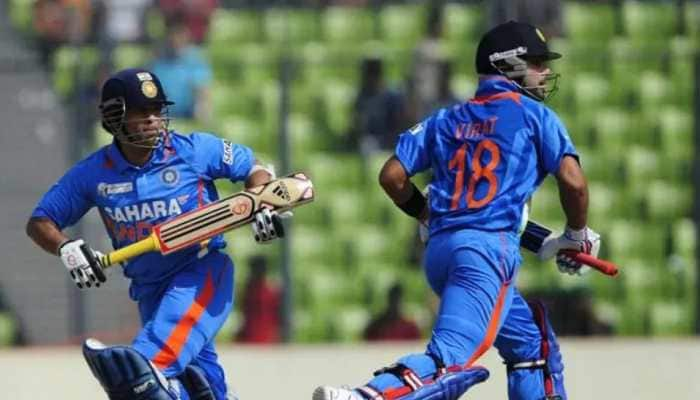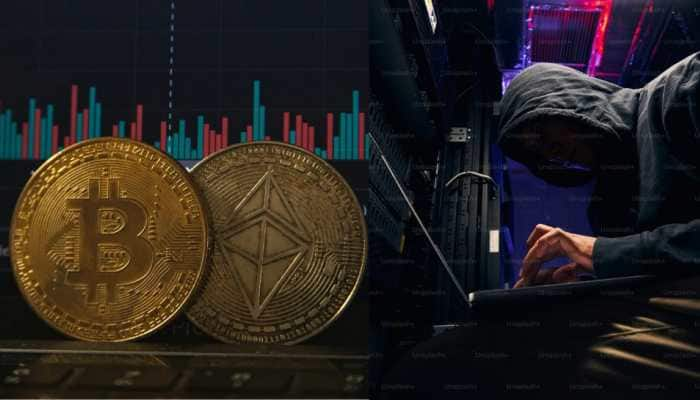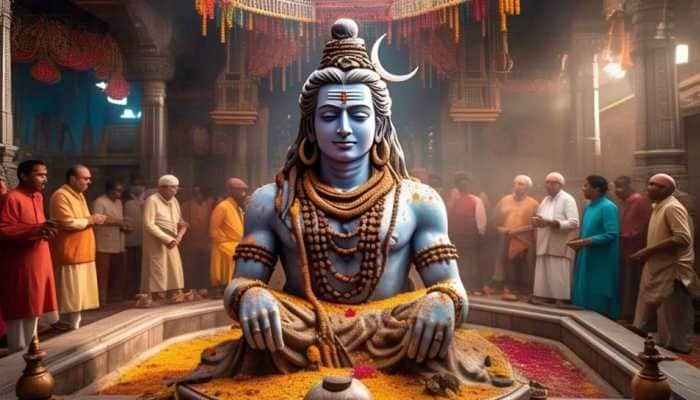Taiwan President Tsai Ing-Wen emerges as the most popular foreign leader in India
The social media proved to be a new battle ground for Chinese aggression vis a vis India and Taiwan.
- The social media proved to be a new battle ground for Chinese aggression vis a vis India and Taiwan.
- Amidst these aggressions, netizens of both the countries are seeing the need for advancement of India-Taiwan relationship with a vantage point.
- Though the birthday greeting by the Taiwanese President to PM Modi was seen as a major development, the Taiwan National Day rattled China to an extreme.
Trending Photos
) Reuters photo
Reuters photo The social media proved to be a new battle ground for Chinese aggression vis a vis India and Taiwan. Amidst these aggressions, netizens of both the countries are seeing the need for advancement of India-Taiwan relationship with a vantage point.
Though the birthday greeting by the Taiwanese President to the Indian Prime Minister was seen as a major development, the Taiwan National Day rattled China to an extreme. China did a blunder in handling the solidarity between Indian and Taiwanese Twitter users to target China, triggering a more fuming pro-Taiwanese campaign.
Earlier, wishing the Indian Prime Minister Narendra Modi on his birthday in September, Tsai Ing-Wen tweeted , “Happy birthday to prime minister of India @narendramodi. Wishing you good health, happiness & continued success in your leadership of the great nation India.”
Events took a new turn when an Indian politician — Tajinder Pal Bagga displayed a poster outside Chinese Embassy in Chanakyapuri in New Delhi on 7’ October, wishing Taiwanese citizens on upcoming Taiwan National Day. Sharing a picture of the poster displayed outside the Chinese Embassy in New Delhi, the Taiwanese Vice-President expressed his elation over Twitter. Conveying his happiness he tweeted — “Proud to see our flag fly high and be recognized all over the world. We thank the people from so many countries who today expressed congratulations and support. Especially our Indian friends. Namaste! #TaiwanNationalDay #MilkTeaAlliance.”
Leading English news channel WION aired and published several news pieces on its TV and online platforms. It also broadcasted a special programme on Taiwan National day titled “The Double Tenth Day Celebrating ROC Taiwan's 109” National Day” in collaboration with Taiwan's Representative Office in New Delhi, leading to the displeasure of the Chinese government. Besides, two major dailies The Indian Express and The Statesman carried full page advertisements, wishing the National Day.
Similarly, another major news broadcaster also broadcasted an interview with Foreign Minister of Taiwan Joseph Wu just before the Taiwan National Day. As soon as the interview was aired, the baffled Chinese Embassy in New Delhi issued a statement to heckle the news organisation. Press Counsellor at Chinese Embassy Ji Rong issued a statement stating that the interview of “so-called Taiwan Foreign Minister’ and using the platform for Taiwan DPP authority separatist activities, “disregarding Indian government's long-standing position.”
Baffled over this, Chinese Embassy in India issued a press release on the night of 7 October for media houses and journalists asking them to refrain from providing time or space to coverage on Taiwan's NationalDay.
“Regarding the so-called forthcoming ‘National Day of Taiwan’, the Chinese Embassy in India would like to remind our media friends that there is only one China in the world, and the Government of the People’s Republic of China is the sole legitimate government representing the whole of China”. Cautioning Indian media, the press note further said, “We hope Indian media can stick to Indian government's position on Taiwan question and do not violate the ‘One China’ principle.”
Responding to the act of Chinese bullying and cautioning Indian media, Taiwan's Foreign Minister Joseph Wu asked communist China in capital to ‘GET LOST’ and tweeted - “India is the largest democracy on Earth with a vibrant press & freedom-loving people. But it looks like communist #China is hoping to march into the subcontinent by imposing censorship, #Taiwan’s Indian friends will have one reply: GET LOST!”.
Besides responding to China, the tweet was seen more as an effort with solidarity of the Indian sentiments as it is noteworthy that the tweet by Taiwanese Foreign Minister came soon after the statement by India’s Ministry of External Affairs on Chinese press release threatening Indian media. Aggressively responding to the press statement, spokesperson of Ministry of External Affairs Anurag Srivastava had said, “There is a free media here in India, that reports on issues that they see fit.”
The controversy on the National Day and the Chinese aggression to check it led to make it immensely popular amongst Indian masses. #TaiwanNationalDay kept trending over Twitter in India for several days,almost a week!
A day after the National Day, Taiwanese President thanked Indians for their wishes and expressed optimism about safeguarding human rights and democratic values. Her tweet read - “Thank you to all our dear friends in India for your well wishes on #TaiwanNationalDay. Together, we can take pride in safeguarding our shared values like freedom & human rights, & defending our democratic way of life. #namaste”.
The tweet was liked by more than fifty-five thousands users and shared by thousands of users. The comments section was flooded with comments like “Hail India, Hail Taiwan”, calling for strengthening of bilateral ties.
In addition, thanking Indians for wishes, the Twitter handle of Taiwan Presidential Office Spokesperson tweeted, “We thank all the freedom-loving people of India for sending best wishes on #TaiwanNationalDay.Your tremendous support means a lot to all of us, & we hope it will inspire others to speak up for democratic values because it's the right thing to do for our region & the world.”
The Taiwanese Foreign Ministry also thanked Indians for congratulatory messages and amazing support on Taiwan National Day. The Ministry,in its official Twitter handle wrote - “Thank you Indians’ congratulatory messages. Taiwan is pleased with this amazing support. When we say that we like India, we believe it.”
These were not the exclusive developments and the conclusion of Taiwan National Day celebrations not at all meant the end of the companionship and targeted messaging as the Taiwanese President kept displaying her fondness for mal association with it. Tweeting her picture with the Taj Mahal, she said-On 15th October “#Taiwan is lucky to be home to many Indian restaurants ,& Taiwanese people love them.I always go for Chana masala and naan, while #chai always takes me back to my travels in #India, and memories of a vibrant, diverse & colorful country.”
Experts also believe that by expressing her desire for Chai (Tea),the Taiwanese president urged to get into a formal alliance of the “Milk Tea Alliance’ countries, including India,Taiwan and Hong Kong. The idea of this alliance recently emerged on social media when netizens of these three countries came to solitary to take on China.
Thanking the Indian twitter users following her in massive numbers, Tsai Ing-Wen on 13" October tweeted — “#Namaste to our friends from #India. Thank you for following me here. Your warm regards remind me of fond memories from time spent in your incredible country, your architectural marvels, vibrant culture & kind people are truly unforgettable. I miss my time there.”
Another top Taiwanese leader Wang Ting-yu, who is also the Co-chair of the Foreign Affairs and National Defense Committee in Taiwanese Parliament also thanked Indians for wishing them on the National Day.He tweeted — Thank you to our Indian friends for the kind wishes! The People of Taiwan admire your spirit, your fearlessness and your determination to stand up for what is right.”
On the same day, China responded to the development by stating that with these developments, New Delhi is ‘playing with fire’. The Chinese Government, through its state media platform the Global Times, took over twitter to state - Hanging up posters arranged by India BJP leader celebrating the “national day” of Taiwan islands outside Chinese Embassy in New Delhi is an act of playing with fire, and will only worsen the already soured China-India ties, Chinese analysts warned.”
In fact, the background of the Chinese press statement lies in the trend wherein Taiwanese leaders are getting more space in the Indian media. Leading Indian media platforms prominently broadcasted and published news related to the Taiwan National Day.
However, one of the pioneering steps that led to this swift proximity was an illustration that appeared on Hong Kong's social media platform lihkg, depicting Lord Rama aiming his arrow at a dragon with a sentence — we conquer, we kill.” The image was soon picked up by Taiwan Times under ‘Photo of the Day. The Taiwan Times also shared it over its Twitter handle. The tweet was picked up rapidly by the Indian social media users. Besides re-tweeting in thousands, several Indian citizens also displayed the illustration as their Whatsapp Statuses, besides sharing it over different social media platforms.
The popularity of the Taiwanese President is soaring high in India as several hundred thousands of Indian users have recently followed her official Twitter handle, including many prominent personalities. This was also evident in the quick jump in number of her followers over Twitter that jumped to 1.4 million from 1.3 million just during the online face-off in and around Taiwan National Day. However, this is not the first time Indians have expressed their admiration for the President of island nation, rather, they also took over social media to wish her when she was recently included in ‘Time 100 List of Most Influential People’ in September, along with prominent world leaders like Angela Merkel, Nancy Pelosi, Kamala Harris, etc. Several communication strategists argue that her rapidly soaring popularity in India shall very well make her a major icon in India, similar to the Dalai Lama.
The official Twitter handle of the Taiwanese Foreign Ministry has also gained a significant surge in the number of Indian followers. Similar is the case with other Taiwanese leaders.
Experts argue that though geopolitical and strategic interests of Indian and Taiwanese governments might be one of the reasons behind the rapidly intensifying bonhomie, it is the common man — the common internet users of both the countries who have driven the new relationship. As the Taiwanese support over social media began pouring in after the Chinese aggression at the LAC, which was reciprocated by the Indian users urging the Indian government to establish formal diplomatic ties and recognize Taiwan. In the past few months, hashtags like #JunkOneChina and #OneChin been trending in India, similar to the trending of #MilkTeaAllianc
The issue of recognition of Taiwan has gained cross-cutting support from all over India as pro-Taiwanese tweets came from users from across the political spectrum. It is believed that though India has officially not junked its ‘One China Policy’, however, under the new friendship and massive demand from the Indian public, it has slowly started to deflect from it- not in letters ,but in principle.
Stay informed on all the latest news, real-time breaking news updates, and follow all the important headlines in india news and world News on Zee News.
Live Tv







)
)
)
)
)
)
)
)
)
)
